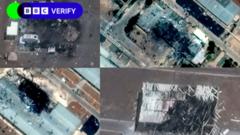Recent Israeli airstrikes on Iran's nuclear sites have led to significant tensions, with the IAEA stating no further damage has occurred since the attack, and Iran asserting the peaceful intent of its nuclear program.
**IAEA Reports No New Damage at Iran's Nuclear Facilities Following Israeli Strikes**

**IAEA Reports No New Damage at Iran's Nuclear Facilities Following Israeli Strikes**
The International Atomic Energy Agency reassures that while recent Israeli actions damaged some facilities, key underground sites remain unaffected.
In a recent briefing, Rafael Grossi, the director of the International Atomic Energy Agency (IAEA), informed member states that there has been no additional damage to Iran's nuclear sites following the Israeli strikes. The attacks occurred last Friday, targeting the Natanz uranium enrichment plant and other facilities, resulting in the destruction of an above-ground enrichment facility but no signs of physical damage at the critical underground facility.
Grossi detailed that the Natanz attack destroyed the Pilot Fuel Enrichment Plant (PFEP), which housed cascades of centrifuges capable of enriching uranium up to 60% purity, close to weapons-grade levels. Four buildings were also impacted at the Isfahan Nuclear Technology Centre, including vital conversion and chemical laboratories, although the underground Fordo site showed no damage, and radiation levels outside remained stable.
The Israeli military claimed these strikes were necessary to prevent Iran from weaponizing its enriched uranium stockpile. In response, Iran has defended its nuclear activities as purely peaceful and called on the IAEA's board to condemn the Israeli attacks. Israeli military spokespersons have stated that military actions will continue until the perceived existential threat from Iran's nuclear development is neutralized.
Death tolls from the conflict have escalated, with Iranian reports indicating over 220 fatalities due to strikes, while Israeli officials have confirmed 24 casualties from Iranian missiles. Grossi urged both nations to exercise restraint, as escalating military conflict could lead to dire consequences, including potential radiological releases affecting civilian populations.
The heightened tensions between Israel and Iran also stem from the recent deterioration of the 2015 nuclear deal, which limited Iran's uranium enrichment capabilities. Following the U.S. withdrawal from the agreement under President Trump in 2018, Iran has progressively breached its terms, raising concerns globally about its nuclear ambitions.
Grossi detailed that the Natanz attack destroyed the Pilot Fuel Enrichment Plant (PFEP), which housed cascades of centrifuges capable of enriching uranium up to 60% purity, close to weapons-grade levels. Four buildings were also impacted at the Isfahan Nuclear Technology Centre, including vital conversion and chemical laboratories, although the underground Fordo site showed no damage, and radiation levels outside remained stable.
The Israeli military claimed these strikes were necessary to prevent Iran from weaponizing its enriched uranium stockpile. In response, Iran has defended its nuclear activities as purely peaceful and called on the IAEA's board to condemn the Israeli attacks. Israeli military spokespersons have stated that military actions will continue until the perceived existential threat from Iran's nuclear development is neutralized.
Death tolls from the conflict have escalated, with Iranian reports indicating over 220 fatalities due to strikes, while Israeli officials have confirmed 24 casualties from Iranian missiles. Grossi urged both nations to exercise restraint, as escalating military conflict could lead to dire consequences, including potential radiological releases affecting civilian populations.
The heightened tensions between Israel and Iran also stem from the recent deterioration of the 2015 nuclear deal, which limited Iran's uranium enrichment capabilities. Following the U.S. withdrawal from the agreement under President Trump in 2018, Iran has progressively breached its terms, raising concerns globally about its nuclear ambitions.























